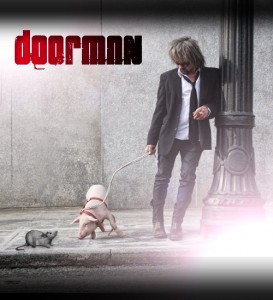
Gustavo "Jack" Doorman Posing With The Undisputed Star Of The Band's Debut Album.
F. Scott Fitzgerald once remarked that life is a process of small ruptures that lead to a tremendous final crackdown. Fitzgerald was one of the gigantic voices of reason in the Jazz Age, an era that many scholars simply remember as “the gaudiest spree” in American history. Like it or not, his insight will always stand in that selected place in which truths that are purely forceful in themselves are found.
What I think, however, is that it is conceivable to look at everything from a different angle. What if life were also a process in which one goes through small significant moments that let him finally discover the definitive moment he wants to be in? I am sure it is not far-fetched to think that a person can form his own perception of anything like that.
Personally, I think I can remember the first time a music performance truly moved me. It was the night Glen Hansard and Marketa Irglova won the Academy Award for the song “Falling Slowly”. That was the central piece from “Once”, a musical ingrained in reality that didn’t deny the deep value of dreams for a single minute.
And what struck me really hard was not only the way they played that night, and the radiant chemistry they displayed onstage. It was the words they spoke as they were given their Oscars.
Marketa said “Fair play to those who dream”. Glen simply remarked “Make art… Make art!”.
That night, it dawned on me that if two independent musicians could take on giants like Melissa Etheridge and Disney and walk away victorious, then maybe it would also become possible for Uruguayan musicians to stand up in non-Spanish speaking markets and succeed on their own terms.
Sure, Uruguayan singer/songwriter Jorge Drexler had won an Oscar himself in 2004 for the song “Al Otro Lado Del Río” [Across The River], but it was a bittersweet moment. He was not allowed to take the stage to play the song. Antonio Banderas and Santana played it, with lots of energy but not a lot of precision. When Jorge was awarded the coveted accolade, he sang a portion of “Al Otro Lade Del Río” accapella. I couldn’t help but wonder if that did nothing but highlight how submissive he had had to be to reach that podium that night and walk away with an Oscar. It all felt a little childish, like a girl who kicks a friend in the shin while his parents are holding him, telling him off for something he had done to her.
But that night in 2007, as those two virtually unknown European musicians had left everybody at the Kodak Theater mesmerized with their interpretative skills and integrity I stood as energized as I could be. If there was ever a moment I felt a sense of true possibility materializing, then that was it. I felt (nay, I knew) Uruguayan musicians would one day be able to stand up on their own two feet, and present their art uncompromisingly to the world.
The independent artist I want to cover today has got me thinking about that, along with the best bands currently active in the Uruguayan scene such as The Bear Season and Casablancas. Doorman is an electronic outfit that takes after the name of its frontman, Gustavo “Jack” Doorman. He writes everything and sings the lead, while the remainder of the band comprises Federico Recarey (bass), Ariel Scarpitta (sequencers), Hangel (drums) and Oscar Naya and Lucas Kanopa (guitars).
The band has already issued an album (“Supermal”, produced by Daniel Anselmi) and it stands as an entrancing mixture of buoyant rhythms and lyrics that are mostly hedonistic, although there is also room for contemplation and sheer regret, as in the song “Sad Situations” (one of their most rock-oriented numbers, and a personal favorite of mine). Continue reading
